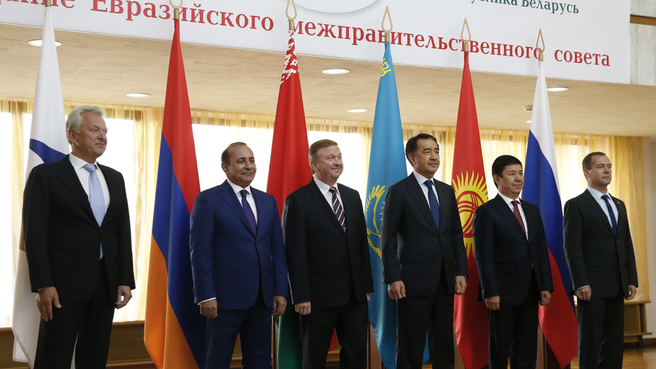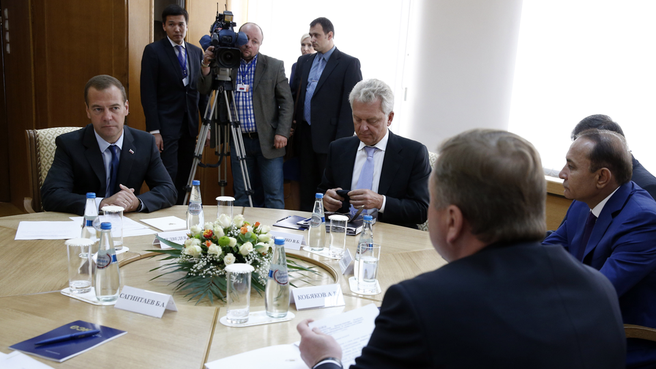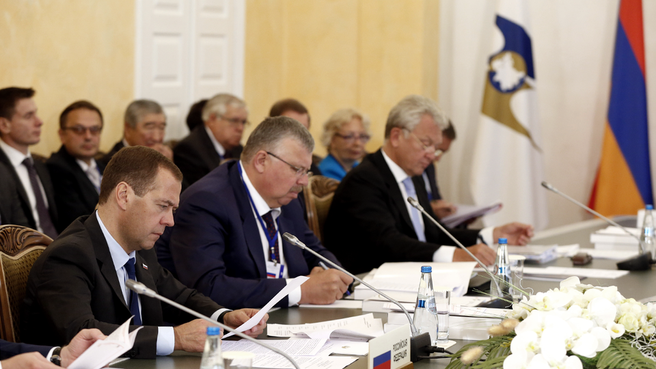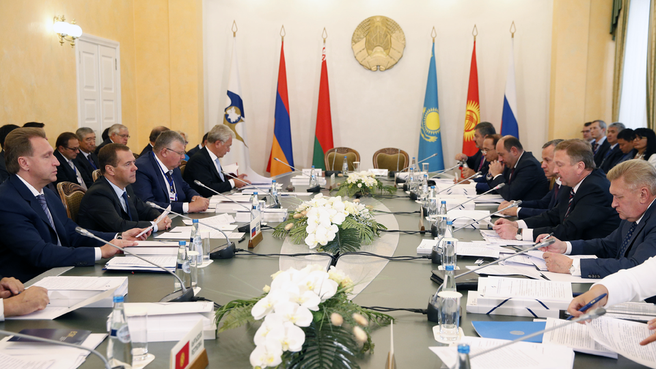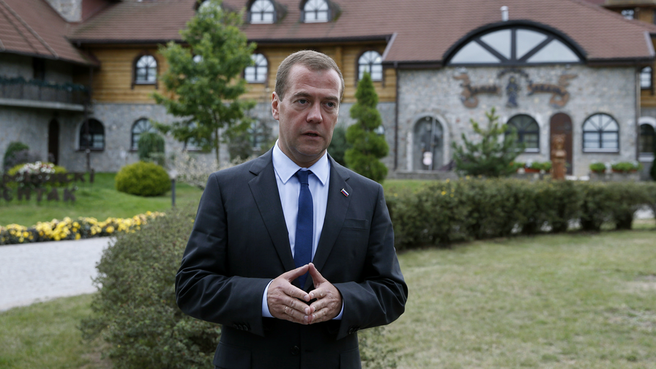The agenda includes discussions on coordinating industrial policies within the EAEU, providing for macroeconomic and financial stability, creating a single market of services and developing relations with other countries and international organisations.
News conference by Dmitry Medvedev
List of the heads of delegations attending the meeting of the Eurasian Intergovernmental Council:
Prime Minister Hovik Abrahamyan of the Republic of Armenia
Prime Minister Andrei Kobyakov of the Republic of Belarus
Prime Minister Temir Sariyev of Kyrgyzstan
Prime Minister Dmitry Medvedev of the Russian Federation
First Deputy Prime Minister Bakytzhan Sagintayev of the Republic of Kazakhstan
Viktor Khristenko, Chairman of the Eurasian Economic Commission's Board
Mr Chairman, colleagues, I’d like to join those who spoke before me in thanking the Republic of Belarus for organising this event at such an interesting venue, as previously agreed. I’d like to congratulate Kyrgyzstan on becoming a full-fledged member of our association. Now, we must move towards creating a fully operational common market for goods and services, and continue forming a legal framework for our union, focusing primarily on barriers, mutual trade limitations and lack of transparency, which still exists. We plan to adopt a new Customs Code in the coming months, to make sure it enters into force in 2016. The agreements governing the procedure for signing international treaties, and agreements on approaches to regulating currency relations and financial markets activities, as well as numerous other documents, will have been signed by the end of the year.
As the Prime Minister of Kyrgyzstan rightly said, we are in a fairly tough economic situation today as compared to when our union was created. The global economy is in a tight spot. The situation cannot be fully rationalised and is quite contradictory. The stock markets and the capital markets in a number of major countries, such as China, as well as the European market, are volatile. In addition to the above factors, the Russian economy is under sanctions pressure. The future of the hydrocarbons market is uncertain. The volatility on the financial and commodities markets is a key feature of the new economic reality, and we must take this into account in developing our policies.
All this creates additional risks for our respective economies, and we can see some of them playing out in Russia already. Clearly, the process of economic recovery and rebuilding investor confidence will take time. However, and this was also aptly noted, that's a good starting point for consolidating our forces and combining our efforts. Cooperation in the sphere of macroeconomic and monetary policies has become particularly important for all of us. We have identified such a mechanism.
I would like to point out the importance of the first meeting of the ministers of economy and finance, and central bank governors that took place in Moscow on 25 August. The decision to hold this meeting was made at the previous Intergovernmental Council meeting. I believe such meetings should be held on a regular basis.
We reached an understanding that it is important to prevent so-called competitive devaluation and avoid the temptation to take advantage of a weaker national currency and capitalise on short-term foreign trade advantages. This is a dangerous path to go down, and may cause imbalance in a number of industries.
The current agenda includes consideration of the draft Guidelines for Industrial Cooperation. This document is overdue and includes a list of priority economic activities and sensitive goods.
We will also need to decide on issues of international cooperation, such as key guidelines for cooperation in 2015 and practical steps to build mutually beneficial relations with the European Union.
A protocol on the accession of Kazakhstan to the World Trade Organisation was signed in late July. We have just discussed this issue. Following its ratification, our partners will begin to implement their commitments. We have actively assisted our Kazakh partners in the talks and, of course, welcome their completion.
Now, it’s imperative to put together measures to prevent possible negative consequences for all our economies. This work is underway, and everything must be done thoroughly.
The unified marking system is related to this issue. I’m pointing this out to you, because we discussed it several times and agreed to run a pilot project using fur products. In the future, the marking should also be used for other products that are part of the sensitive products group.
However, things are moving more slowly than we expected, but this issue is important for everyone. This mechanism is effective in dealing with the flow of grey goods, and can also be instrumental in addressing a number of issues that have arisen in connection with our partners joining international organisations and our integration association. Finally, we need to agree on our future meetings. We agreed to meet on a quarterly basis, and are willing to look at our partners’ proposals. Thanks again for organising this meeting in Grodno.
News conference by Dmitry Medvedev
Transcript:
Question: Can you start with our relations with Belarus, please? Would it be fair to say that growth in our bilateral trade is mainly due to the banned products, which are known to have entered Russia via Belarus? Has this problem been settled?
Dmitry Medvedev: We have good relations with Belarus both in the framework of our integration association and on a bilateral basis. We will continue the talks after this briefing.
Of course, our trade depends on the economic situation and hence a number of specific factors. Bilateral trade increased immediately after the establishment of the Customs Union and the Eurasian Economic Union, but at present it has slumped due to economic constriction and falling hydrocarbon prices. On the other hand, our trade has intensified in terms of food deliveries. We highly value our Belarusian suppliers, who have filled the gap in our food balance at this time. I’m referring to Belarusian deliveries of dairy and meat products after we banned food imports from several European and other countries. We are happy with our cooperation in this sphere, which has helped us close the gap on the food market that was created by these decisions.
As for all kinds of grey schemes and smuggling, we have the same policy for all countries, including our Belarusian partners: these schemes are inadmissible. We have been fighting and will continue to fight them. We fully agree that the delivery of products that have not been produced or processed in Belarus is a violation of the current ban on imports, which is also referred to as counter-sanctions. We’ll continue working to prevent these deliveries, using customs and other measures towards this end.
Overall, the current situation is good for creating joint ventures for growing or processing agricultural products. We have met in the Grodno Region. Look at the quality of soil here. The region is indeed the breadbasket of our Belarusian friends. It has always been like this here. They have great harvests here. They told me the average harvest is 5,000 kilogrammes or more per hectare, and some farms harvest 7,000 or more kilogrammes. Russian farms can do this too: they harvest 5,000, 6,000 and even 7,000 kilogrammes per hectare on average. In light of this, I believe that sharing technology and selection achievements is the cornerstone of our future common market and food security.
Question: Mr Medvedev, a question from Reuters. Gazprom has expressed its concern several times over Ukraine’s not storing enough gas. Does this mean that Russia will resume gas deliveries for Ukraine’s storage facilities soon?
Dmitry Medvedev: You know that our gas policy in Ukraine has always been open. Even in the current complicated situation, when our bilateral relations have deteriorated and are far from the best we’ve ever had, we have nevertheless offered our Ukrainian partners the opportunity to import our gas at reduced prices. You know that the Russian Government adopted a resolution on the application of a special preferential price to Ukraine, which stipulates discount duties so that Ukrainian customers would buy gas at slightly over $247 per 1,000 cubic metres. For a reason that is unclear to me, our Ukrainian partners rejected that opportunity. At the same time, we know that it pays $20 or $30 more for the reverse gas it buys from several European countries. Those who know this can calculate the difference and see if it’s more profitable to buy Russian gas or pay $20 or $30 more for reverse gas, which cost between $270 and $280 per 1,000 cubic metres in the third quarter, because we calculate our prices for three month-periods.
We are not opposed to resuming bilateral trade if that is what Ukrainian consumers want, but we are not going to force the matter. If they want to shift the burden onto consumers, onto their own citizens, they are free to do so and then answer to their people, who should know how much they pay for the gas imported from friendly European countries.
As for the future, we are willing to discuss different cooperation scenarios. We always told our Ukrainian partners that we can supply gas at a price comparable to the prices the other countries pay, meaning EU countries located at a distance comparable to that of Ukraine. In fact, the price I mentioned is very close to, or even lower than the prices which some European countries pay. So, if they are ready, we can continue these talks. At the same time, we’d like to remind them that winter is coming, and that last winter passed relatively painlessly for the ruined Ukrainian economy in terms of gas because it was warm and Ukraine didn’t need much gas, but we don’t know what the coming winter will be like. We are also aware that the amount of gas that has been pumped into Ukraine’s underground storage facilities is approximately 25 percent lower than the country needs. The thing is that the carry-over amount of gas should be about 18-19 billion cubic metres (bcm), whereas Ukraine has only stored 14-15 bcm of gas, and not all of it can be used due to the laws of physics and the methods used to retrieve gas from underground facilities. In other words, they should store more gas, or they will have problems this winter.
Question: Mr Medvedev, going back to Russian-Belarusian relations, I have a question about an agreement on a Russian air base in Belarus, which is currently being drafted. What is the proposed content of this agreement? Most importantly, when will it be signed? Can similar agreements be signed with other countries, members of the CIS or other associations involving Russia?
Dmitry Medvedev: Let’s have a look atthe history of these documents. It began in 2009, and I was directly involved in it. At that time, we drafted and signed agreements dealing with the joint protection of Russian and Belarusian borders and the joint air defence system. In effect, the agreement you mentioned aims to implement them. It is nothing out if the ordinary.
As far as deadlines for drafting and signing these documents are concerned, we proceed from the assumption that it should suit both the Belarusian side and us. The Government has simply given a green light for the document in line with the current procedure and has submitted it to the President. In terms of deploying similar air bases, we already have them, as you know. This applies to Kyrgyzstan and Armenia, and there is nothing surprising about it. In fact, we are ready to sign such agreements with all countries with which Russia has allied relations, be it member states of the Collective Security Treaty Organisation, or the CSTO members that are also part of the Union State, like the Republic of Belarus.
Question: Interfax news agency. We have recently seen personnel reshuffles at several major state companies. Can we say that the Government is dissatisfied with these companies’ management and spending in this difficult economic situation? Should we expect any more reshuffles?
Dmitry Medvedev: All decisions need time to mature. The decisions regarding the companies you mentioned matured and were adopted for various reasons. But, of course, it would be wrong to say that these decisions have to do with spending alone. At the same time, I believe that virtually all companies with state capital have the potential to cut back on their spending. Everyone should be streamlining expenditures nowadays, including state agencies (I’m talking about federal executive agencies) and companies with state capital. All of them have substantial budgets, and these companies can hardly be called poor. On the other hand, these companies assume tremendous social responsibility, including responsibility for infrastructure monopolies, for executing the state’s economic policy; responsibility to the public for the operation of transport, the supply of gas, electricity and heating to consumers. In effect, all of them are responsible for the economy.
Naturally, in the current situation, they should reduce their spending somewhat, focus, so to say, and assess the expenditures that can be streamlined. They have already done this, and this process was not launched today. Nevertheless, they have the required potential for reducing their expenditures further and, maybe, even their investment programmes. The Government has repeatedly pointed this out. Bear in mind that representatives of virtually all companies with state capital attend Government meetings and take part in discussions, and this process will continue. Naturally, our colleagues working for state companies should prepare for this. I’ll try to get them together in the near future to discuss this issue once again. There are also plans to analyse how meticulously budget funding is being transferred to state companies or federal executive agencies because our funding, currently being allocated for the implementation of state contracts and state deliveries, should not merely be deposited at banks for a profit. We want these assets to be spent completely in line with their designation. I’m planning to hold several meetings on this subject quite soon.
